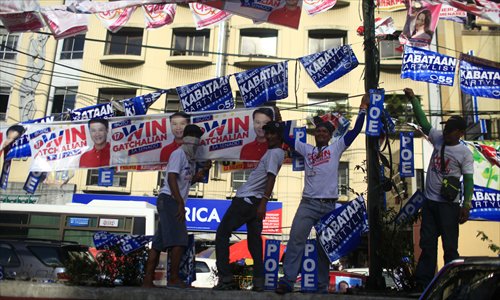Philippine polls to have geopolitical implications
Candidates’ stance on sea disputes draws attention

Supporters of Sherwin Gatchalian dance at a rally in Manila on Sunday. Gatchalian is currently running for the Philippine Senate. The elections will be held on Monday. Photo: Li Hao/GT

The Philippines is scheduled to hold its presidential elections on Monday, with analysts believing that the race is the most complex in years whose result will bear broad geopolitical implications.
On Monday, up to 54 million eligible voters out of a population of 100 million can vote to choose their next president, vice president and more than 18,000 local government executives and lawmakers in the country's general elections which take place every six years.
The result of the presidential race will be announced on May 25, and the new president will assume office on June 30.
A poll released Friday shows controversial candidate and Mayor of Davao City Rodrigo Duterte polling in the lead on 33 percent, with Senator Grace Poe trailing on 22 percent and former secretary of the Interior and Local Government Mar Roxas on 20 percent, the Manila Times reported.
"This is the most complex and changeable election in the Philippines ever, as the candidate with the highest support rates has changed several times in the past year," said Li Kaisheng, a research fellow at the Shanghai Academy of Social Sciences. He told the Global Times that this volatile situation can be attributed to emotions running high among voters and the candidates being well-matched in strength.
"Even though the voters are probably more interested in domestic policies related to their livelihoods, the South China Sea issue will also matter in the election as it is a long-existing dispute," Gu Xiaosong, an expert on Southeast Asian studies at the Guangxi Academy of Social Sciences, told the Global Times on Sunday.
According to Li, on the South China Sea issue, besides Senator Miriam Defensor Santiago from the People's Reform Party who has a low support rate, the other four presidential candidates can be divided into two camps: Poe and Roxas, who support current President Benigno Aquino's current policy of siding with the US and containing China, and Duterte and Jejomar Binay, who believe that negotiation is the way to resolve disputes with China.
Hong Kong-based South China Morning Post reported Tuesday that Duterte told 1,000 of his supporters on May 1 that he is "open to the possibility of joint exploration for energy assets with China," and to "ask China to help build key railway projects connecting Manila to provinces."
"Duterte's lead in the polls in some degree reflects the failure of Aquino's economic policies in a country where people are looking for improvement. This is where China can provide support," Gu said.
Parades, slogans, statues
On Saturday, rallies in Manila reached new heights. People wearing different colored shirts and wearing wristbands with candidates' names paraded through the streets. Some rode on buses and motorcycles, shouting slogans.
In four locations, the celebrations were especially strong. Crowds gathered to hear "miting de avance," a term used to describe a public speech made by running candidates to the electorate to present their political platforms.
At a rally for Poe, people danced and paraded while carrying a statue of her. At a different rally for Duterte, vendors sold shirts emblazoned with his name and the English word "change" on them. His supporters filled up an open park to hear his speech with many camping at the site hours ahead.
Carlos, a resident in the district of Quiapo, told the Global Times he supports Duterte, because he thinks Duterte will deal with government corruption and provide a safer environment.
Wilson Flores, a local columnist, said he believes Duterte will win as "he's similar to Putin in personality and world-view."
Arbitration consensus
Despite their differences, all candidates support the South China Sea arbitration case brought by Manila and currently under consideration at The Hague, and would like to "uphold the sovereignty" of the Philippines in the disputed waters, Li said.
"All the candidates' proposals on this issue were based on this consistency. The difference is just how to deal with it," Li added.
Gu also warned that no matter what the candidates are proposing right now, their policies might change once elected president.
"How the election affects relations between the two countries will depend on the result of the arbitration and the new government," Li said.
Ninety-one percent of Filipinos said they were concerned about the South China Sea dispute, the highest number in Asia, while 54 percent still held a positive view toward China, according to a survey by the Pew Research Center in September 2015, the Wall Street Journal reported.